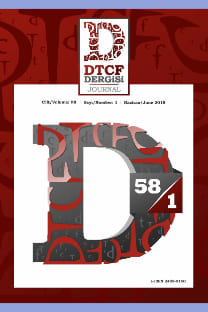JACQUES LACAN'IN YAPISALCILIK İLE KARMAŞIK İLİŞKİSİ
LACAN'S COMPLICATED RELATIONSHIP WITH STRUCTURALISM
___
Bär, Eugen. “Understanding Lacan.” Psychoanalysis and Contemporary Science. Vol III. Ed. L. Goldberger ve V.H. Rosen. New York: International UP, 1974. 473- 544.Benveniste, Emile. Problems in General Linguistics. Trans. M. E. Meek ve Coral Gables. Florida: University of Miami Press, 1971.
Britton, Celia. “Structuralist and poststructuralist psychoanalytic and Marxist theories.” The C ambridge H istory o f L iterary C riticism. Vol.VIII. Ed. Raman Selden. Cambridge: Cambridge UP, 1995. 197-254.
De Saussure, Ferdinand. Course in General Linguistics. Trans. Wade Baskin. New York: McGraw-Hill, 1966.
Derrida, Jacques. Of Grammatology. Trans. Gayatri Chakravorty Spivak. Baltimore, Maryland: John Hopkins UP, 1997.
Derrida, Jacques. Resistance of Psychoanalysis. Trans. P. Kamuf, P. Brault ve M. Naas. Stanford, CA: Stanford UP, 1998.
Eagleton, Terry. Literary Theory. Oxford: Basil Blackwell, 1983.
Eliott, Anthony. Psychoanalytic Theory. 2. ed. New York, NY: Palgrave, 2002.
Emig, Rainer. “Literary Criticism and psychoanalytic position.” The Cambridge History of Literary Criticism. Vol IX. Ed. C. Knellwolf ve C. Norris. Cambridge: Cambridge UP, 2001.
Gallop, Jane. Reading Lacan. Ithaca: Cornel UP, 1985.
Gosh, Mallika. “Lacan and Post-Structuralism.” International Journal of Sociology and Social Anthropology (IJSSA). 1.1 (Dec. 2016): 85-89.
Holland, Norman. Psychoanalytic Psychology and Literature-and-Psychology. New York, Oxford: Oxford UP, 1990.
Kornbluh, Anna. “Freud’s Return to Lacan.” After Lacan. Literature Theory and Psychoanalysis in the Twenty-First Century. Ed. Ankhi Mukherjee. Cambridge: Cambridge UP, 2018.41-57.
Lacan, Jacques. The Seminar of Jacques Lacan Book II: The Ego in Freud’s Theory and in the Technique of Psychoanalysis 1954-1955. Trans. Sylvana Tomaselli. New York: Norton, 1988.
Lacan, Jacques. Écrits (1st complete edition in English). Trans. B ruce F ink. N ew Y ork: W .W. Norton, 2006.
Mukherjee, Ankhi. Introduction. After Lacan. Literature Theory and Psychoanalysis in the Twenty-First Century. Ed. Ankhi Mukherjee. Cambridge: Cambridge UP, 2018. 1-22.
Rabate, J.M. The Cambridge Introduction to Literature and Psychoanalysis. Cambridge: Cambridge UP, 2014.
Sarup, Madan. Jacques Lacan. Hertfordshire: Simon & Schuster, 1992.
Stanford Encyclopedia of Philosophy. Web. 10.10.2018.
Wright, Elizabeth. Psychoanalytic Criticism: Theory in Practice. Lacan: Methuen, 1984.
- ISSN: 0378-2905
- Yayın Aralığı: 2
- Başlangıç: 1942
- Yayıncı: Ankara Üniversitesi Dil ve Tarih-Coğrafya Fakültesi
2017 YÜZEY BULUNTULARI IŞIĞINDA KIZILİN YONTMATAŞ ENDÜSTRİSİNİN TEKNO-TİPOLOJİSİ
AMORES I.1: AMORES'İN İZDÜŞÜMÜ
TEN DAYS IN A MAD-HOUSE: 'AKIL HASTASI' GÖÇMENİN AMERİKAN ISLAH SİSTEMİNE HAPSEDİLİŞİ
THE PRINCIPLE OF BEAUTY: THE GOTHIC IN JOHN KEATS'S ISABELLA; OR, THE POT OF BASIL
RECONSTRUCTION OF THE PAST IN GÜNTER GRASS'S “CRABWALK”
İRAN EDEBİYATINDA GAZELDEN ÖYKÜYE BİR METİNLERARASILIK ÖRNEĞİ: BİN DAMADIN GELİNİ
KONYA SULTAN MEYDANI'NA DAİR KAYIP BİR KİTABENİN DEĞERİ
